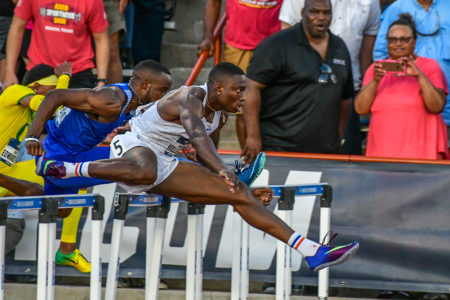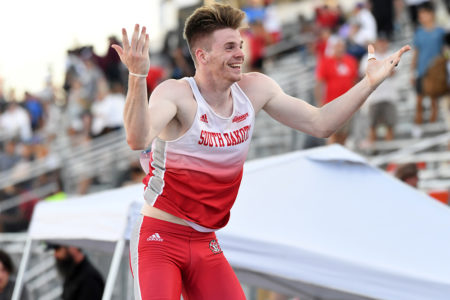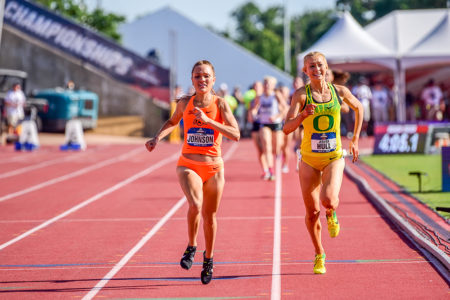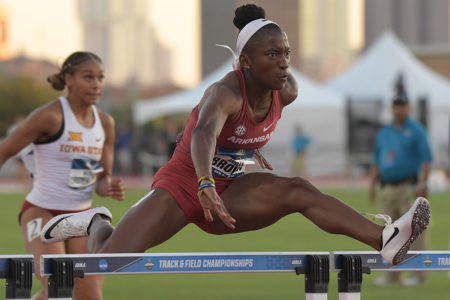Here’s this month’s collection of generally off-track activities that have gone a long way towards shaping the way the sport is headed
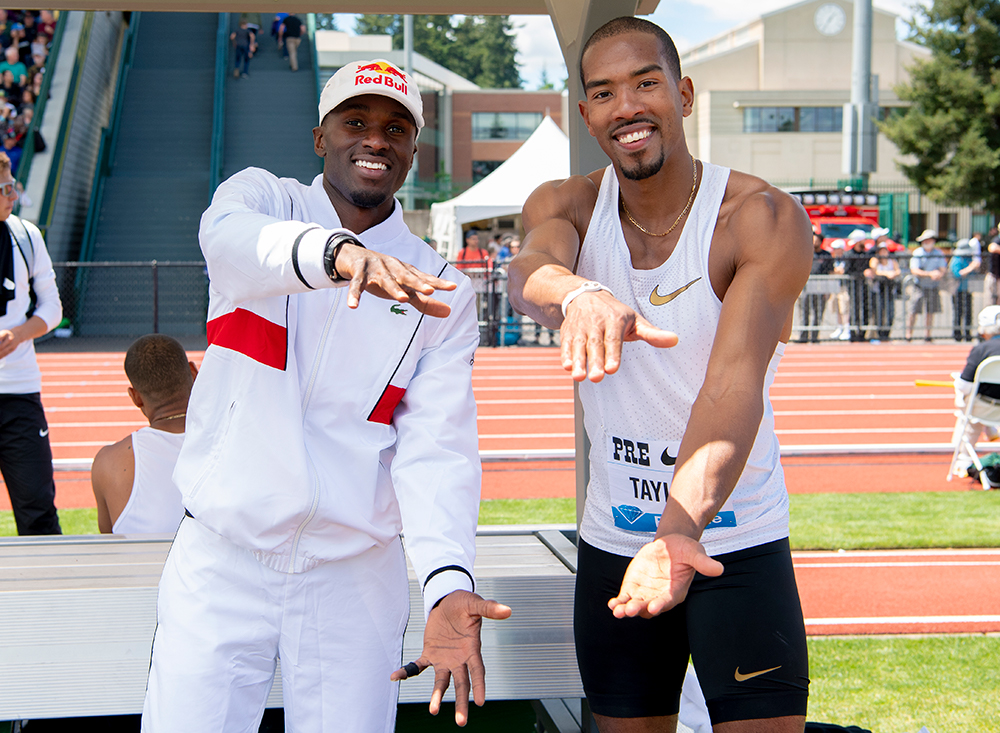
Triple Jumpers An Endangered Species?
Conspicuously absent from the Rome DL were American TJ aces Christian Taylor and Will Claye. Both took to social media to express their displeasure at the circumstances. Said reigning world/Olympic champ Taylor, “It’s a real shame to have to miss out on competing at @goldengala_roma due to budgetary reasons. I hope the @Diamond_League and triple jump can find a way to work together to produce a world-class show. I seriously fear my event being removed from the circuit altogether.” Said Claye, “This meeting promoter said he wouldn’t negotiate me coming to his meet until I ‘showed fitness’ so by the time I opened up on May 18th the ticket prices rose. That’s not my fault.” Claye also said, “It is unfortunate that we can’t make it but I respect [meet director Gigi D’Onofrio] for putting on a great meeting in Rome. I just don’t agree with how us athletes are being unfairly treated.” With the ’20 Diamond League scheduled for a “new look,” many athletes—particularly field eventers—may have good reason to fear for the future of their discipline as part of the program.
Meanwhile, In TrackTown…
With the ’21 World Championships approaching fast for Eugene—and the new Hayward Field reportedly on track to be ready for the ’20 Pac-12 meet—some in Oregon are questioning where things are going.
Eugene Register-Guard columnist Austin Meek, in the wake of a closed-door briefing to Seb Coe by representatives of Oregon21, wrote, “Finding someone to talk about the World Championships is a surprisingly difficult task. TrackTown USA, the local organization that led the charge to secure the world championships, now defers all questions about the event to Oregon21, an LLC formed to represent the various world championship stakeholders. Planning for the event is being handled by Niels de Vos, the executive director of Oregon21. De Vos, the former head of UK Athletics, was hired 7 months ago to lead Oregon21. Since then Oregon21 has cut ties with a public affairs agency working on its behalf, and attempts to interview de Vos have been unsuccessful.”
Ken Goe of the Portland Oregonian wrote that many local fans are fearful that with years of no regular-season meets at Hayward, the legendary TrackTown magic may wane: “Fans might become reinvigorated when the new Hayward Field opens, when the 2020 Olympic Trials are contested, when the World Championships come to town. But the real test will come later, when the big events have come and gone, when the gates open for a UO home meet on a soggy, 45-degree spring day.”
4-Year Ban For Jarrion Lawson; Off To CAS
A positive test has earned World Champs sprinter/long jumper Jarrion Lawson a 4-year ban. The World Champs silver medalist gave a sample in the summer of last year which showed traces of Epitrenbolone, which is a metabolite of Trenbolone, an approved steroid used in beef production. An AIU panel has ruled that Lawson failed to prove that the substance entered is body through tainted beef consumption. Lawson’s agent, Paul Doyle, told Reuters, “It is absurd that the WADA code places such an impossible burden on athletes to prove the source. How can you go back and test meat that was eaten months ago?” Said Lawson, who will appeal the verdict to CAS, “I am innocent and I maintain confidence that eventually things will be righted.”
The IAAF & Nigeria: A Rapprochement?
The money kerfuffle between the IAAF and Nigeria appears to be on its way to being settled, though neither side is sharing much in the way of details. It all started when the international federation accidentally added a zero to its annual auto-deposit grant of $15,000 to the Nigerian federation, depositing $150,000. For more than a year the two sides quibbled over repayment. There are indications the Nigerians have already repaid a small portion. The board of the Nigerian federation also impeached its president when he denied knowing anything about the money’s whereabouts.
The Nigerians reacted badly to Seb Coe’s threat of sanctions if the amount was not immediately repaid, with the nation’s sports minister calling it a “calculated attempt to demean and destroy Nigerian athletics.” The IAAF clarified that by “sanctions” it did not mean it would ban Nigeria from international competition. Now, following a phone call between Coe and the sports minister, the IAAF says an “amicable resolution has been reached and the matter will be settled very soon.” The IAAF says it is confident the full amount will be returned.
Semenya Cleared To Run… For Now
In the wake of the CAS decision to uphold the IAAF’s testosterone protocols, embattled South African star Caster Semenya filed an appeal with the Swiss Federal Tribunal, which issued a “superprovisional order” instructing the IAAF to suspend the application of its DSD Regulations as they apply to Semenya. The IAAF said in a release, “No other athlete is covered by the order. As of this date, the order is scheduled to remain in force only until 25 June 2019, the time the SFT has given the IAAF to respond to the appellant’s case.”
Under the IAAF protocol, Semenya was prohibited from competing in events from the 400 through the mile, but free to run shorter or longer than that window. Since the ban her only competition was a 2000 in France. Subsequently, there was a messy back-and-forth between Semenya’s representatives and the Rabat DL over whether or not she had received an invitation and whether or not it had been in time. In mid-June the Pre Classic—which comes 5 days after the court deadline—said it would accept her entry for its 800.
In another mid-June development, CAS released the full 163-page judgment that led to its supporting the IAAF position. That led to the revelation that the federation had sought to have Semenya declared a “biological male,” which didn’t sit well in the South African’s camp. Said Semenya, “The IAAF used me in the past as a human guinea pig to experiment with how the medication they required me to take would affect my testosterone levels. “Even though the hormonal drugs made me feel constantly sick, the IAAF now wants to enforce even stricter thresholds with unknown health consequences. I will not allow the IAAF to use me and my body again.”
RIP: Gabe Grunewald
One of America’s top milers, 32-year-old Gabriele Grunewald (née Anderson), passed away in June after a 10-year battle with a rare cancer. First diagnosed with adenoid cystic carcinoma as a Minnesota senior in ’09, Grunewald went on to finish 2nd in the NCAA 1500 the following spring. In the years since, she put together an impressive record as an athlete while undergoing major surgeries and fighting back several recurrences of the disease. In ’12, Grunewald finished an agonizing 4th in the Olympic Trials. The following season, she ran her PR 4:01.38 in Monaco, along with an 8:42.64 for 3000. In 2014 she won the USATF Indoor 3000 and finished 9th at the World Indoor.
In 2016, she ran in the Olympic Trials 1500 and 5000, making the finals in the shorter race. Shortly afterward she shared the news that the cancer had returned and that a tumor and part of her liver had to be removed. Her final race came in Sacramento at the ’17 USATF. In 100-degree temperatures, in between chemotherapy sessions and with a fever several days before, she still managed to run 4:31.18 in her heat.
Along the way she worked hard to publicize the need for more funding and research into rare cancers. The slogan “Brave like Gabe” became a rallying cry for thousands of runners, as well as the name of her foundation. All told her efforts raised several million dollars for the fight.
A Transgender National Champ
CeCe Telfer captured the NCAA Div. II 400H title for Franklin Pierce University in 57.53, winning overwhelmingly by 1.68 seconds. What makes the performance notable, if not problematic, is that for 3 years Telfer competed on the men’s team as Craig Telfer, with a PR of 57.34 over higher hurdles. Telfer identifies as female now and was competing under the guidelines of the NCAA’s transgender policy, which stipulates that athletes in this category have to undergo “one calendar year of testosterone suppression treatment.” Reportedly, the NCAA has not set a limit for maximum testosterone levels for male-to-female athletes and has no mechanism for testing.
Understandably, Telfer’s performance has raised a ruckus in some quarters, but the hurdler was interviewed on ESPN’s Outside The Lines and said, “If anything, me competing against cis gender females is a disadvantage, because my body is going through so many medical implications… Being on hormone replacement therapy… your muscle is deteriorating, you lose a lot of strength.”
A Fairer Shake For Pregnant Athletes?
In the wake of female athletes calling out Nike for its lack of support to contract athletes when they are pregnant—and Nike’s vow to reverse that situation—the USOC says it is working on reforms to make sure athletes don’t lose insurance during maternity. Three Democratic U.S. senators wrote to the USOC to provide details on this aspect of the athlete insurance policy, saying the discontinuation of insurance for pregnant athletes is “unconscionable and may put at risk her health and that of her child.” The USOC responded with a statement saying, “Pregnancy or needing a break from competition for other important reasons can’t unfairly impact eligibility, and we are working to ensure that policy is uniform across each NGB’s eligibility standards.”
Russia Continues To Struggle
Russia isn’t doing itself any favors in its attempts to get the IAAF ban lifted prior to the 19 Worlds. The latest bombshell is a report that Russian officials forged paperwork to help Danil Lysenko, the ’17 World silver medalist in the high jump, avoid a doping ban over a missed test. Lysenko, busted for a whereabouts violation, came up with papers from doctors at a bogus Moscow clinic alleging that he was too ill to share his location with drug testers. Russian officials have promised to cooperate with the investigation.
High jump star Mariya Lasitskene says that she’s fed up with the entire situation: “I hope that the people involved in this never-ending disgrace still have the courage to leave. By themselves. And don’t think I’m only talking about the management. It’s also about the current coaches who are still sure that you can’t win without doping. They’re long overdue for retirement. A new generation of our athletes must grow up with a different philosophy, and for any athlete, it’s the coach who provides that.” Lasitskene’s statement falls in line with recent comments by the head of Russia’s anti-doping agency.
Meanwhile, the country’s top track official said on Russian TV that he had been given guarantees by the IAAF that the federation would be reinstated prior to Doha. Not true, countered the IAAF, “no promises have been made.” In a related development, Russian officials will be barred from any senior positions in the IAAF at this year’s Congress.
Other shoes may be dropping soon as WADA has handed over more than 100,000 computer files from the discredited Moscow laboratory to the Athletics Integrity Unit. The 500-gig packet covers 2012–15 and perhaps will lead to another round of DQs. □

